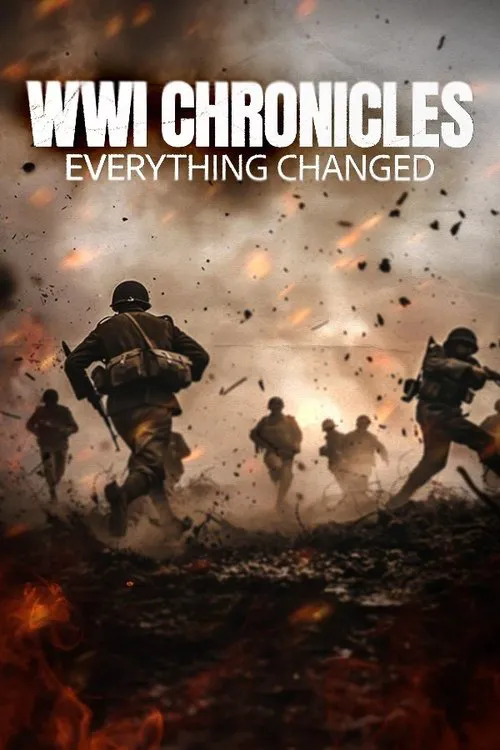WWI Chronicles: Everything Changed

Trama
WWI Chronicles: Everything Changed is a gripping documentary that delves into the tumultuous period preceding World War I, shedding light on the simmering tensions beneath the empires and the fateful events that led to one of the deadliest conflicts in human history. At the heart of the documentary is the story of Archduke Franz Ferdinand, heir to the Austro-Hungarian throne, whose assassination in Sarajevo on June 28, 1914, is widely regarded as the catalyst that ignited the war. As the documentary takes viewers on a journey through the years leading up to World War I, it becomes clear that the world was on the brink of a perfect storm. Europe's major powers, including Germany, France, Britain, and Austria-Hungary, were engaged in a complex web of alliances and rivalries that would eventually culminate in the outbreak of war. The documentary masterfully weaves together a narrative that reveals the intricate relationships between nations, highlighting the tensions and rivalries that had been building for decades. In the early 20th century, Europe's imperial powers were embroiled in a game of great power politics. The Balkans, a region in southeastern Europe, was a hotbed of nationalist tensions and competing interests, with various factions vying for control. The Great Powers, as they were known, were determined to assert their influence in the region, with each attempting to outdo the others in a show of military might and diplomatic maneuvering. One of the key players in this game was Austria-Hungary, a sprawling empire that had long been at odds with its Balkan neighbors. Under the leadership of Emperor Franz Joseph, Austria-Hungary sought to assert its dominance over the region, but its efforts were met with resistance from various nationalist groups. The situation was further complicated by the presence of Germany, which was eager to assert its influence in the region and expand its own empire. Meanwhile, in Russia, a new revolutionary government had come to power, determined to assert its influence in the region and spread its revolutionary ideals to the rest of Europe. As the situation in the Balkans continued to deteriorate, Russia and Austria-Hungary found themselves on a collision course, with each side vying for control of the region. It was against this backdrop of escalating tensions and competing interests that the assassination of Archduke Franz Ferdinand took place. The Archduke, who was visiting Sarajevo to inspect military maneuvers, was the target of a group of assassins from the Black Hand, a secret society of Bosnian Serb nationalists. Among the assassins was Gavrilo Princip, a young Bosnian Serb who was determined to use violence to achieve his goals. On June 28, 1914, the Archduke's motorcade was passing through the city center when Princip stepped forward and fired two shots at point-blank range. The Archduke and his wife, Sophie, were both fatally wounded, sparking a chain reaction of diplomatic crises and military mobilizations that would eventually lead to the outbreak of war. As the documentary reveals, the assassination of Archduke Franz Ferdinand was not simply a random act of violence but was rather a deliberate attempt to spark a wider conflict. The Black Hand and other nationalist groups had long been frustrated by the decline of their influence in the Balkans and saw the Archduke's visit as an opportunity to strike a blow against their enemies. In the aftermath of the assassination, Austria-Hungary, with the blessing of Germany, issued an ultimatum to Serbia, which was designed to isolate and humiliate the country. The ultimatum, which included a list of impossible demands, was a deliberate provocation, designed to spark a wider conflict. When Serbia refused to comply, Austria-Hungary declared war, triggering a chain reaction of military mobilizations and declarations of war that would eventually draw in all of the major powers. The documentary masterfully captures the tension and chaos that characterized the days leading up to the outbreak of war. As national leaders and diplomats scrambled to respond to the crisis, it became clear that the world was on the brink of a catastrophic conflict that would change the course of history forever. As the war unfolded, it became clear that the Great Powers had grossly underestimated the magnitude of the conflict. The fighting was brutal and unrelenting, with millions of soldiers on both sides slaughtered or maimed on the battlefields of Europe. The devastating trench warfare and the use of new technologies such as poison gas, machine guns, and tanks led to unprecedented levels of destruction and suffering. In the end, it was the combined efforts of the Allies, including Britain, France, and Russia, that ultimately led to the defeat of the Central Powers, including Austria-Hungary, Germany, and the Ottoman Empire. The Treaty of Versailles, signed in 1919, imposed harsh penalties on Germany and its allies, sowing the seeds of a second, even deadlier conflict in World War II. As the documentary comes to a close, it is clear that the events leading up to World War I were a complex and multifaceted phenomenon that involved a vast array of national leaders, diplomats, and soldiers. The assassination of Archduke Franz Ferdinand was merely the catalyst for a war that would change the course of history forever, leaving in its wake a legacy of destruction, chaos, and unprecedented human suffering.
Recensioni
Raccomandazioni


